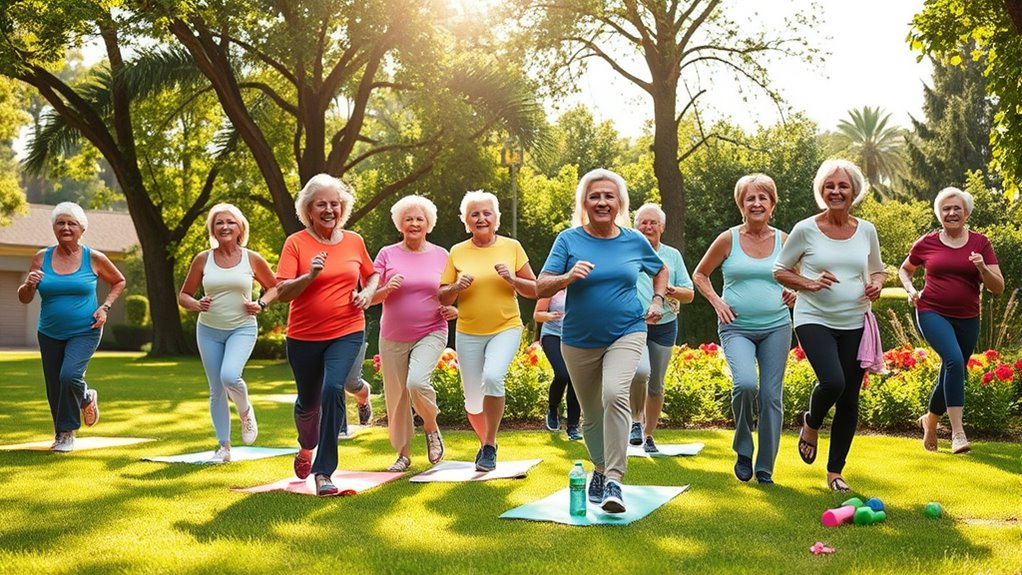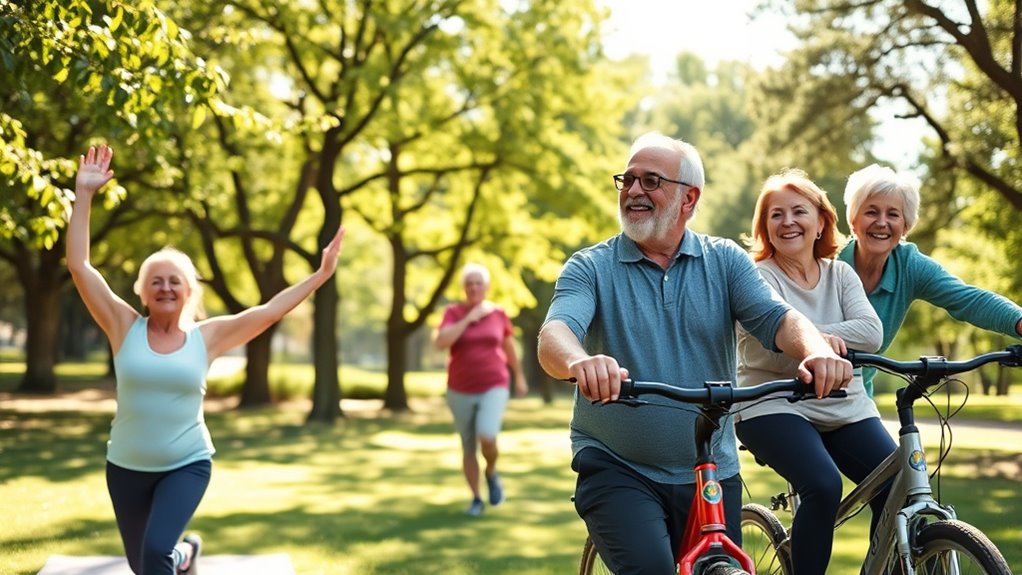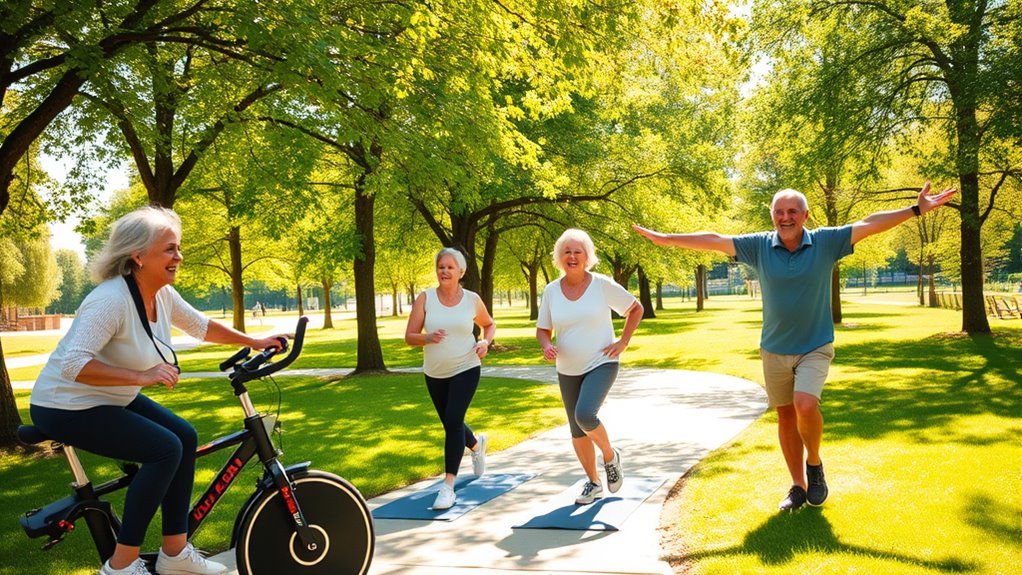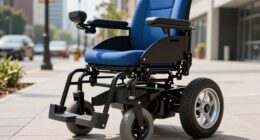Cardio’s essential for keeping your heart happy and healthy as you age. Engaging in just 150 minutes of moderate-intensity aerobic activity each week can boost your heart health, lower the risk of chronic diseases, and enhance your overall well-being. Activities like walking, dancing, or swimming not only get your heart pumping but also improve mood and cognitive function. There’s so much more to explore about cardio and its benefits for your life—let’s dive deeper!
Key Takeaways
- Engaging in at least 150 minutes of moderate-intensity cardio weekly significantly reduces the risk of chronic diseases in seniors.
- Activities like walking, swimming, and dancing enhance cardiovascular health while improving mobility and coordination.
- Regular cardio strengthens the heart, helping maintain healthy blood pressure and cholesterol levels for better overall health.
- Cardio also boosts mental well-being by reducing anxiety and improving sleep quality, contributing to cognitive health.
- Always consult a physician before starting an exercise routine and monitor intensity to ensure safety during workouts.
Why Should Seniors Do Cardio?

As you age, staying active becomes crucial for maintaining your health, and incorporating cardio into your routine can make a considerable difference.
Cardio for seniors isn’t just about exercise; it’s an essential practice that can help improve heart health. Regular exercise lowers the risk of chronic conditions like hypertension and dementia, promoting overall well-being. Engaging in cardiovascular activities strengthens your heart, helping you maintain healthy blood pressure and cholesterol levels. Additionally, studies show that pet therapy can enhance emotional well-being, which may complement the benefits of regular physical activity. Moreover, developing a growth mindset can further motivate seniors to embrace physical activity as part of their daily lives. Furthermore, integrating predictive modeling can assist in tailoring exercise plans based on individual health data, ensuring more effective and personalized routines. Additionally, early detection of any health issues can lead to timely interventions and better management of overall wellness.
Cardio is vital for seniors, enhancing heart health and reducing risks of chronic conditions while promoting overall well-being.
Plus, cardio enhances joint health by improving circulation, alleviating discomfort, and reducing stiffness. You’ll also notice increased balance and coordination, which greatly lowers the risk of falls.
Finally, regular cardio boosts your mood and cognitive function, thanks to the endorphins released during workouts, making your mental health flourish. Additionally, creating an environment that supports aging in place can further encourage consistent activity and enhance overall quality of life for seniors.
Benefits of Cardio for Heart Health

Cardio exercise isn’t just about staying active; it plays an essential role in lowering your risk of chronic diseases like hypertension and diabetes. Incorporating positive thinking into your daily routine can further enhance your motivation to engage in regular cardio workouts. Engaging in regular cardio can also help build resilience against stress, contributing to a more vibrant life as you age. By boosting your heart health, you’re also enhancing your overall well-being, which can lead to a more vibrant life as you age. Additionally, regular aerobic activity can improve your circulation, similar to the effects of beet juice, making a significant difference in how you feel every day. Furthermore, enjoying frozen yogurt as a healthier dessert option can provide you with essential nutrients that support your cardiovascular health. Additionally, incorporating health benefits of honey such as its antioxidant properties can further support your cardiovascular system.
Lower Chronic Disease Risk
Engaging in regular cardiovascular exercise is one of the best ways to lower your risk of chronic diseases like hypertension, diabetes, and heart disease. By committing to 150 minutes of moderate-intensity aerobic activity each week, you can enhance your heart function while improving your blood pressure and cholesterol levels. Additionally, incorporating air purifiers into your home environment can further support your overall well-being by reducing airborne allergens and pollutants. Investing in gold IRA options can also help secure your financial health in retirement, which is essential for maintaining a stress-free lifestyle. Furthermore, maintaining an awareness of RMDs can ensure that your retirement funds are used effectively, allowing you to focus on your health.
Activities such as walking, dancing, and swimming not only promote heart health but also boost your endurance and mobility, which can help reduce the risk of falls. Research indicates that consistent cardio exercise can lead to a 30-40% reduction in the likelihood of developing chronic diseases, encouraging a longer, healthier life. Moreover, proper nutrition plays a vital role in enhancing your physical performance and overall health. Additionally, incorporating self-care routines into your exercise regimen can further support your overall well-being.
The CDC also recommends these activities to support cognitive function and overall heart health as you age.
Enhance Overall Well-Being
Regular cardiovascular exercise not only strengthens your heart but also contributes considerably to your overall well-being. Engaging in cardio activities can lower the risk of chronic conditions like hypertension and dementia, while improving blood pressure and cholesterol levels. You’ll also enhance your joint health and mobility, thanks to better blood circulation. Additionally, medication management for dementia can play a crucial role in ensuring that any cognitive decline does not hinder your ability to engage in physical activities. Plus, consistent cardio can improve your balance and coordination, reducing fall risks by up to 23%. Importantly, emotional and psychological growth can also be positively influenced by maintaining an active lifestyle, as regular exercise helps to boost motivation levels and enhance your overall engagement in daily tasks. Additionally, maintaining healthy circulation is essential for maximizing the benefits of cardiovascular workouts. Incorporating hydration and nutrition into your routine can further support your cardiovascular health and energy levels.
| Benefit | Impact on Heart | Overall Well-Being |
|---|---|---|
| Lowers chronic disease | Stronger heart | Enhanced quality of life |
| Improves circulation | Healthier arteries | Increased mobility |
| Boosts balance | Reduced risk | Greater independence |
Aim for at least 150 minutes of moderate-intensity exercise weekly for ideal results!
Recommended Cardio Activities for Seniors

While staying active is essential for health as you age, finding enjoyable cardio activities can make all the difference.
Walking is a simple yet effective way to boost your heart rate, improve cardiovascular health, and enhance your balance.
If you have joint issues, swimming offers a low-impact workout that promotes heart health while allowing for social interaction.
Dancing, in its various forms, not only elevates your heart rate but also improves coordination, making it a fun option.
Cycling strengthens your legs and enhances cardiovascular fitness, and it can be adapted for those concerned about balance.
Finally, engaging in yoga provides gentle cardio while improving strength, flexibility, and balance—key elements for maintaining your mobility. Additionally, incorporating emotional alignment practices can further enhance your overall well-being as you engage in these activities.
At-Home Cardio Exercises for Seniors

Finding ways to stay active at home can be both fun and effective for maintaining cardiovascular health. You can try at-home cardio exercises like squats and lunges to strengthen your legs and improve balance, all while requiring minimal space.
The “Get-Up” exercise builds strength and confidence as you practice standing up from the floor. Consider adding a Suitcase Carry, where you walk with a weighted object to enhance core strength.
Incline push-ups on a sturdy surface are great for upper body strength at any fitness level. Engaging in these activities contributes to the CDC’s recommendation of 150 minutes of moderate-intensity aerobic activity weekly, supporting healthy aging and helping manage high blood pressure for a healthier heart.
Special Considerations for Seniors With Heart Conditions

If you have a heart condition, getting your doctor’s approval before starting any exercise routine is essential.
You’ll want to monitor your exercise intensity to stay within safe heart rate limits, so consider using a smartwatch or fitness tracker.
Always listen to your body and don’t hesitate to seek help if you feel any discomfort while exercising.
Physician Approval Essential
Before starting or changing your exercise routine, especially if you have a heart condition, it’s essential to get physician approval. This step guarantees your activities are safe and tailored to your health needs.
Here are key points to take into account:
- Consultation: Discuss your current health status and any concerns with your doctor.
- Heart Rate Monitoring: Learn how to monitor your heart rate during exercises to prevent overexertion.
- Tailored Routines: Work with your physician to create an exercise routine that matches your individual capabilities.
- Listen to Your Body: Be aware of symptoms like dizziness or chest discomfort and seek medical advice immediately.
Taking these precautions can help keep your heart happy and healthy while you stay active!
Monitor Exercise Intensity
Once you’ve secured physician approval, it’s important to focus on monitoring your exercise intensity, especially if you have a heart condition.
Using fitness trackers or smartwatches can help you stay within your safe heart rate limits during physical activity. Start each session with a 5 to 10-minute warm-up to gradually elevate your heart rate, and cool down similarly to promote recovery.
This approach not only regulates your heart rate but also helps prevent injury. Tailoring your exercise routine is essential; avoid overexertion to guarantee a sustainable fitness journey.
Listen to Your Body
Listening to your body is essential, especially when exercising with a heart condition. By paying attention to how you feel during workouts, you can help guarantee a safe and effective fitness journey.
Here are some key points to keep in mind:
- Always get physician approval before starting or changing your exercise routine.
- Warm up and cool down for 5 to 10 minutes to regulate your heart rate.
- Use smartwatches or fitness trackers for monitoring exercise intensity and staying within safe limits.
- If you experience dizziness, shortness of breath, or chest discomfort, stop immediately and seek medical advice.
Tips for Staying Active and Motivated

Staying active as you age is essential for maintaining your health and well-being, and finding ways to keep yourself motivated can make all the difference. Aim for at least 150 minutes of moderate-intensity physical activity each week; this not only improves balance but also boosts your heart health.
Choose enjoyable activities like dancing, swimming, or gardening to make exercise fun rather than a chore. Set achievable goals, starting with just 10 minutes of walking daily and gradually increasing your duration.
Engaging in group classes or walking clubs adds a social element, enhancing accountability. Finally, track your progress with a journal or fitness app to celebrate small victories, keeping your motivation high and your routine consistent.
Cardio and Mental Health for Seniors

Maintaining an active lifestyle not only benefits your physical health but also plays a significant role in your mental well-being. Regular cardio can help you stay sharp and improve your mood.
Here are some key benefits:
- Enhances brain activity and cognitive function.
- Reduces the risk of Alzheimer’s and dementia by promoting neuroplasticity.
- Releases endorphins that elevate mood and alleviate anxiety and depression.
- Improves sleep quality, essential for mental acuity.
The American Heart Association recommends at least 150 minutes of moderate-intensity aerobic activity weekly.
This routine can help manage blood pressure and support your heart while enhancing your overall mental health.
Prioritize regular cardio, and you’ll notice the positive impact on both your mind and body.
Incorporating Strength Training Into Your Routine

Strength training is a key part of staying healthy as you age, and it can greatly enhance your muscle health and functionality.
By incorporating exercises like squats and push-ups into your routine at least twice a week, you’ll not only build strength but also improve your overall well-being.
Let’s explore some effective exercises and how they can benefit you.
Benefits of Strength Training
Incorporating strength training into your routine has numerous benefits that can enhance your quality of life as you age.
Here are four key advantages:
- Maintains Muscle Mass: Strength training helps counteract muscle loss, allowing you to perform daily activities with ease.
- Improves Heart Health: It raises HDL cholesterol levels while lowering LDL cholesterol, reducing your risk of heart disease.
- Enhances Bone Density: Resistance exercises improve bone strength, lowering the risk of osteoporosis and fractures.
- Boosts Balance and Coordination: Strength training improves stability, greatly reducing your risk of falls.
Recommended Exercises for Seniors
Engaging in strength training can be a game-changer for seniors looking to improve their overall health and functionality. Incorporating strength exercises at least two non-consecutive days a week helps enhance muscle strength, supporting daily activities. Pairing these exercises with aerobic activities like walking or cycling increases endurance and balance, which are essential for reducing fall risks.
| Exercise Type | Frequency | Benefits |
|---|---|---|
| Free Weights | 1-3 sets of 12 reps | Builds muscle, lowers blood pressure |
| Resistance Bands | 1-3 sets of 12 reps | Improves flexibility, boosts HDL cholesterol |
| Bodyweight Exercises | 1-3 sets of 12 reps | Enhances stability, supports daily tasks |
| Flexibility & Balance | 2-3 times a week | Reduces injury risk, improves coordination |
Consider including flexibility and balance exercises like tai chi or yoga for a thorough routine!
It’s Never Too Late to Start Exercising

Even if you’ve never exercised before, it’s never too late to start reaping the benefits of cardiovascular activity.
Engaging in cardio can transform your health and well-being at any age. Here are some compelling reasons to get moving:
- Improves heart health – Regular exercise strengthens your heart and reduces the risk of heart disease.
- Enhances mobility – Staying physically active can improve your balance and flexibility.
- Boosts mental clarity – Cardio exercises are linked to better cognitive function.
- Promotes better sleep – You’ll likely experience improved sleep quality, leading to more energy.
Starting now, even in your 60s or 70s, can greatly improve your life.
BrightStar Care: Supporting Your Fitness Journey

Starting your fitness journey can feel overwhelming, but with the right support, you can navigate it smoothly. BrightStar Care is here to help you maintain an active lifestyle through personalized exercise programs. Their caregivers guarantee you have a safe environment to engage in activities that suit your needs and health conditions. They emphasize the importance of getting those 150 minutes of cardio per week to keep your heart healthy and reduce the risk of blood pressure issues.
| Activity | Minutes/Week | Benefits |
|---|---|---|
| Walking | 150 | Improves heart health |
| Swimming | 120 | Low impact, joint-friendly |
| Dancing | 90 | Fun, boosts mood and energy |
With BrightStar Care’s resources, you’ll be motivated and on your way to achieving your fitness goals!
Frequently Asked Questions
What Is the Best Cardio for the Elderly?
When considering the best cardio for the elderly, you’ll find that options like walking, swimming, and cycling stand out.
Walking’s low-impact nature makes it easily accessible, while swimming provides a gentle full-body workout.
Cycling, whether on a stationary bike or outdoors, strengthens your legs and boosts heart health.
Plus, dancing adds a fun twist to cardio, enhancing coordination and cardiovascular fitness.
Remember to choose activities that you enjoy to stay motivated!
How to Improve Heart Health for Seniors?
To really hit the nail on the head when improving heart health, you need to stay active. Aim for at least 150 minutes of moderate-intensity aerobic activity each week, like walking or swimming.
Don’t forget muscle-strengthening exercises on two or more days, too! Monitoring your intensity is essential, so keep an eye on that heart rate.
Staying active not only keeps your heart happy but also lifts your spirits and sharpens your mind.
What Is the Best Cardio for Heart Health?
The best cardio for heart health includes activities like walking, cycling, swimming, and dancing.
These exercises raise your heart rate and can be adjusted to fit your fitness level. Aim for at least 150 minutes of moderate-intensity aerobic activity each week, such as brisk walking or cycling.
Regularly engaging in these activities not only strengthens your heart but also improves circulation and lowers blood pressure, contributing to overall well-being.
What Cardio Is Good for Your Heart and Lungs?
Imagine your heart and lungs as a well-tuned orchestra, each instrument playing in harmony.
To keep this symphony thriving, you’ll want to engage in activities like brisk walking, swimming, or cycling. These exercises strengthen your heart and enhance lung capacity, creating a beautiful rhythm of blood flow and oxygen exchange.
Aim for at least 150 minutes of these cardio gems weekly, and your body will thank you with improved health and energy.
Conclusion
So, if you think you’re too old for cardio, think again! Embracing heart-healthy workouts can keep you feeling young and vibrant. It’s amusing how many seniors avoid exercise, yet it’s the secret to a lively lifestyle. Remember, it’s never too late to lace up those shoes and get moving! Your heart will thank you, and who knows? You might just discover a new passion along the way. Keep your heart happy and healthy—you’ve earned it!









